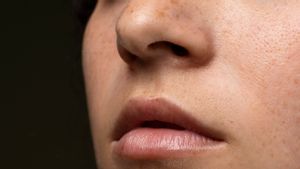YOGYAKARTA Many people believe the myth that wearing sunscreen can reduce levels of vitamin D in the body. According to a medical explanation, especially from dermatologists, wearing sunscreen protects the skin from exposure to the sun's UV. The goal is to protect the skin and minimize damage and the worst impact, preventing skin cancer. In fact, people who use sunscreen every day can maintain their vitamin D levels.
Vitamin D has many benefits. Starting from reducing the risk of disease, such as heart disease, type 1 diabetes, rheumathoid arthritis, to reducing cancer deaths. In addition, vitamin D helps keep bones strong by regulating body calcium levels. Getting vitamin D is sufficient, preventing muscle aches, muscle weakness, and bone aches.
It is important to understand that research has never found that the use of sunscreen every day causes a deficiency of vitamin D. Launching the Skin Cancer Foundation page, Tuesday, August 20, wearing sunscreen is important. Because the sun's UV rays are identified as carcinogens that damage skin cellular DNA and cause skin cancer. In addition, UV radiation is harmful to the eyes and causes catatrics, markel cancer, and eye skin cancer, including melanoma.
That means, exposure to unprotected sunlight puts you at risk of experiencing a number of conditions that damage the skin permanently. Plus, the myth about wearing sunscreen can reduce vitamin D levels in the body, it must be straightened out. Moving on to the fact that sunscreen is formulated can filter most of the solar UVB radiation. Because UVB is spread causing skin damage.
The wavelength of UVB is a specific wavelength that triggers the production of vitamin D in the skin. However, clinical studies have never found that the use of sunscreen every day causes a lack of vitamin D.
SEE ALSO:
Sunscreen with SPF 15 screens 93 percent of UVB, SPF 30 filters 97 percent of UVB, and SPF 50 filters 98 percent of UVB. That means there are still between 2-7 percent of UVB that reach the skin even with high SPFs. Another fact is that the body does not need to be exposed to much sun to produce vitamin D. Even experts recommend sunbathing for no more than 10-15 minutes. Dry arms, legs, stomach, and back for two to three times a week. Also pay attention to the hours when the sun does not sting, such as between 8-9 a.m.
This small amount of sunlight produces all the vitamin D that can be processed by your body. After that, your body automatically starts throwing vitamin D away to avoid excess vitamins. This means that exposure to excess sunlight does not provide anything other than skin damage caused by sunlight. In addition to sunbathing, getting vitamin D from foods and supplements can also be done.
The English, Chinese, Japanese, Arabic, and French versions are automatically generated by the AI. So there may still be inaccuracies in translating, please always see Indonesian as our main language. (system supported by DigitalSiber.id)


















